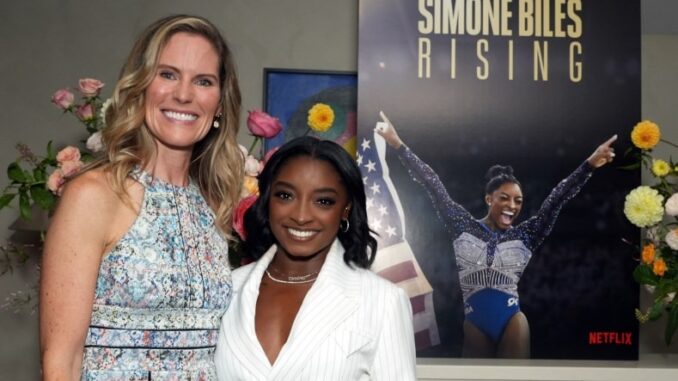
Simone Biles is already one of the most decorated athletes in history, but now she has her sights set on a very different kind of gold—an Emmy Award. With Netflix’s powerful docuseries “Rising” capturing her personal and professional journey, Biles is once again proving that her influence extends far beyond the gymnastics floor. Let’s dive into why this series has become a cultural touchstone and why Emmy buzz is already surrounding it.
Who Is Simone Biles? A Quick Refresher
Simone Biles is widely regarded as the greatest gymnast of all time. With 37 Olympic and World Championship medals, she has shattered records, redefined gymnastics, and inspired a generation. But beyond her jaw-dropping skills, she has become a symbol of resilience, mental health advocacy, and empowerment.
What Is Netflix’s ‘Rising’ About?
Netflix’s “Rising” isn’t just a sports documentary—it’s an intimate portrait of Biles as an athlete, a woman, and a public figure navigating immense pressure. It chronicles:
-
Her struggles during the Tokyo Olympics.
-
Her decision to prioritize mental health over medals.
-
Her triumphant return to the sport.
-
The personal sacrifices behind her legendary career.
It’s raw, emotional, and inspiring—qualities that make Emmy voters take notice.
After conquering Paris with four Olympic medals, the world’s most-decorated gymnast turns her focus to TV’s top honor as Simone Biles Rising vies for Best Documentary Series. With three gold medals and a silver from the Paris 2024 Olympic Games, Simone Biles proved her return to gymnastics was nothing short of GOAT status. Now, the most-decorated gymnast in history is on the quest for more gold — this time, an Emmy. Netflix hosted a Simone Biles Rising FYC event at Stella restaurant in West Hollywood, where Biles and series director Katie Walsh mingled with a few dozen Television Academy members before sitting down for an intimate dinner.
The docuseries, nominated for Best Documentary or Nonfiction Series at the 2025 Emmys, chronicles Biles’ journey after she withdrew from the Tokyo 2020 Olympics due to the “twisties,” a dangerous mental block that affects gymnasts midair. Four years later, in Paris, she reclaimed her spot atop the podium — but not without a scare. During the qualification round, Biles suffered a calf injury that threatened her quest for more gold. She ultimately pushed through the pain to win gold in the women’s team event, individual all-around, and vault, plus a silver in floor exercise.
The project has already earned industry accolades, including a PGA Award for Best Sports Program and two Critics Choice Documentary Awards for Best Sports Documentary and Best Limited Documentary Series. Speaking with Gold Derby ahead of the dinner, Biles called the Emmy nomination “surreal.”
“I couldn’t believe it, and I don’t think I processed what they were actually telling me until afterwards,” she recalled. “They worked so hard to portray this film as close to my life as possible. I was shocked — but I would’ve been more shocked if we didn’t do it.” “I took a deep breath and found myself getting teared up,” she said. “This project has been so special because Simone is so special. I couldn’t ask for a better person to go through this with.”
While Biles has plenty of Olympic medals, the Emmy race is a new kind of competition. Asked if she’d swap one of her medals for a golden statuette, she laughed, “Unfortunately, I would not swap one of my medals, but I would love to add to the collection.” Filming the road to Paris — including the injury scare —required care and trust. Walsh recalled the tension of waiting for test results in the Olympic village. “At one point, I sat for three hours next to a giant dumpster, waiting to hear if Simone was okay,” she said. “It was so hot, and we were so stressed. But every day, rules changed on whether we could even be there, so we stayed calm and adapted.”
Biles said having the crew around those high-pressure moments was actually comforting. “They’re like family now,” she said. “I didn’t really see the cameras — I saw them as supporters, part of my support system. Since my family couldn’t be there, it was nice knowing Katie was coming that day.”
Walsh said one of the goals of Rising was to address the misconceptions that followed Biles after Tokyo. “There were so many voices criticizing Simone who didn’t understand her experience,” Walsh explained. “We wanted to educate people and show that while you may not relate to flipping through the air, everyone has struggles in their life.”
For Biles, Netflix’s reach made it the right platform for such a personal project. “Behind the scenes, people don’t get that inside view,” she said. “We wanted to take them through the whole process — the good days and the bad days — and make it feel real and raw. And with Netflix being global, it means everyone has the opportunity to watch.”
The Paris chapters were particularly intense for Walsh, who was editing episodes in real time while traveling. “Every day we filmed, then at night we uploaded footage to L.A., gave notes, and got new cuts the next morning,” she said. “I set up an office in the back of a production van because traffic was crazy. I slept, but I never rested for three and a half weeks.”

Biles has since developed an interest in producing and hopes other athletes will tell their stories. “Elite athletes, what we do isn’t normal,” she said. “When you watch, you feel that connection through the screen. I’d love to do more of this and tell other athletes’ stories.”
Her advice to the next generation of athletes is simple but hard-earned: “Always be brave. Always be kind because you never know what people are going through behind the scenes. It’s okay to take a break, to pause, to recollect your thoughts … to rise again. Everyone’s journey is unique. Go out there and write your own story.”